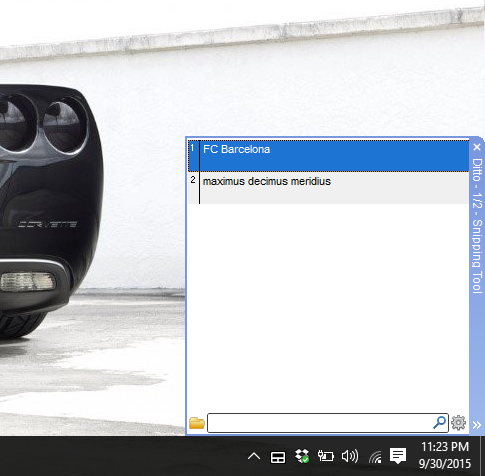Today we take a stab at the age old of question of “Is an antivirus required on Windows 10?” Find out how you can be a smart user and our favorite apps for maximum security, and convenience (yes, it’s possible!).
Windows Defender is good enough… if you’re careful
The internet is a dangerous home to a significant number of threats that come in all shapes and sizes such as malware, spyware, adware, viruses, and the list goes on.
Today, we will talk about how various programs can help protect you against these threats and how to better protect yourself from these threats should you feel the need of avoiding other programs.
When we talk about the first program of the list – Windows Defender – we see a fantastic in-house application since Windows 7 to help better protect your system. Having used the software since Windows 7, I can say that the software has come really far since then and is absolutely amazing in Windows 10.
Having used Windows 10 since release and being on the same installation till now, Windows Defender has done a spectacular job at catching and detecting threats on my system. This is something that Windows 7 / 8 Version of Windows Defender failed to do at times and my system would be victim to viruses or other invaders, forcing a reinstall.
I have been using my Windows installations without third-party anti-viruses since Windows 7 due to them always complicating my daily routine.
My installations of Windows 7 / 8 would last me a couple of years at most before having to reinstall due to one reason or the other; having Windows Defender as the only software protecting my system.
Windows Defender is really a great piece of software! Though it doesn’t give you the full functionalities that other paid anti-viruses do, it still offers superb first party protection, proof of which you can find in these tests [WinBeta Link].
If you are still compelled by the need of using a superior anti-virus, feel free to give them a trial run and seeing how each runs on your system.
Majority of the antivirus software on the market do offer a month or week-long trial which is adequate time for you to determine whether or not the software is a proper fit for you and your system.
However, from my experiences at least, anti-viruses are an unneeded burden on the system and later on amount to bloatware, basically.
Whether I had 16GB of RAM on my desktop or 8GB of RAM on the laptop, removing an antivirus would do wonders for the performance of my system and it only took me a few hours to familiarize myself with the hazards on the Internet.
If you feel like an antivirus is your best bet, give the trial run a go and determine for yourself whether or not they are a benefit to your system or not. Otherwise, I would always recommend being a careful user who watches over their system with vigilance.
Remember: treat your system right, and it will treat you right!
What does it mean to be careful?
Over the years, from trial and error, I have learned a few lessons on how to be careful on the Internet and ensuring I protect myself against threats.
Easily, the biggest culprits that always affected my system were virus filled USBs from other students or other individuals. One bad virus in USB connected to my Windows 7 / 8 PC meant instant death for the OS which no software could ever remedy. In the end, I would be forced to do a complete reinstall. I’ve had a great experience with Windows Defender in Windows 10, however.
Here are some tips for you to better protect your system from threats on the Internet!
- If you see any type of suspicious file on a USB such as “new folder.exe” or a shortcut to your USB within the USB or or a cmd file: DO NOT CLICK on any of them! This will only spread the virus on your system and will make your life a nightmare.
- Only download content from trusted sites. Furthermore, be aware of what you are downloading. If you find anything in a format in which it shouldn’t be, avoid interacting with it, i.e. Star Wars: The Force Awakens.exe is definitely a virus since a movie can’t be an executable file. Videos usually come in .mp4, .avi, or .mov formats.These are only some of the threats that can be a problem to your OS and in turn compromise your data, or otherwise sensitive information. We will cover the above and more in an article in the future, so be sure to watch out for that!
- Always be careful of what you install on your system! Only install applications if you know their function and if you are sure they have a good reputation. Try to avoid pirated/cracked apps. Find a freeware alternative to an app; just search for something on Google.
- Lastly, always make sure you don’t hand over your payment information or use such information on untrustworthy sources. Only use your online payment methods, i.e. PayPal, debit / credit cards etc. with reputed companies such as Amazon, Best Buy, Microsoft, etc – companies that are well known and reputed.
It all comes down to being a smart Internet and computer user. Download media only from trusted sources and if you don’t know how to, seek the help of someone who can help you instead of risking your computer with viruses or other threats.
You can greatly increase your security with these apps
Malwarebytes Anti-Malware
Malwarebytes’ Anti-Malware [Official website] is a long standing, incredible piece of security software! Even if you use it for free, the program will give you a plethora of options to maintain and protect your system without you having a number of apps and micro-managing them.
Below is a table that tells you the features between the free version and the premium version of the software. If there is a single piece of software I would recommend, it would have to be Malwarebytes since I have been using this on my system since the days of Windows XP.

As you can see from the table, it gives you comprehensive and all-round protection against all major threats on the internet. It has always been the one app I turn to when my system is in need of a good security agent. Malwarebytes is best used for scanning your PC for security threats every month or so.
Malwarebytes is definitely the go-to software that acts as an all-in-one bundle for your protection needs.
FileHippo.com Update Checker
FileHippo is easily one of my favorite sites on the internet. It is a humongous repository for innumerable software and cataloguing their versions, both old and new. It is, in a way, similar to APK Mirror for Android.
Their Update Checker program [Official site] is what truly shines the best and makes sure you are saved from the trouble of approving a million prompts of updating one software or the other.

The free program will scan your Windows installation for software and routinely check for their updated versions, download them, and install them for you! It does of course allow you select what you want or do not want to update.
This is convenience taken to whole new lengths, and saves you the trouble of having to download and install all your program updates for you.
The reason you would want to keep your software’s updated is not only to avail new features in them, but to also avoid having a current vulnerability or exploit being taken advantage of by hackers or other third parties who wish ill for your system and privacy.
This is especially important for security softw
are since their updated versions and definitions are made to detect newer threats on the internet with the help of definition updates. Hence, it is highly recommended you always keep your security programs updated, at least.
Replacing Windows Defender with BitDefender’s free AV
Windows 7 used to notify you constantly when it comes to installing an anti-virus. Ever since Windows 8 was released, Microsoft installed Windows Defender into their operating systems by default. They also carried forward this trend to Windows 10, hence Windows has anti-virus software by default. Is Windows Defender the best anti-virus for your computer? How reliable is it?
Windows Defender is, as I’ve said before, quite decent. It is light on system resources, and catches common malware with ease. If you are a careful user, you can’t go wrong with it!
There is, however, better anti-virus software out there. We’ll be sharing one such anti-virus for your information.
BitDefender is a reliable, strong anti-virus software that even allows you to set parental controls. It has high protection rate against infections and viruses and the lowest impact on the overall performance of the system. It is also completely compatible with Windows 10! Although the free edition is a trial, the benefits of BitDefender make its paid version completely worth it.
If you want to know how to install BItDefender on your system, follow the steps below:
1. Go to BitDefender’s official website at www.bitdefender.com.

2. Go to “Home Users” and select Trial Downloads

3. . Select BitDefender AntiVirus Plus 2016 and click download now

4. Enter your email address and click the download free trial. Simply install it like you would any other app after this step.
Use uBlock Origin plugin for Firefox / Chrome
uBlock Origin is one of the best adblocking plugins you can have for your browser. Popular ones include uBlock Origins, Adblock and Adblock Plus. Have you ever encountered websites that don’t allow you to read their content because ads keep popping up everywhere? uBlock Origin can help block all ads coming from any website.
It is recommended to use as well, as some popups and ads are highly malicious in nature. Installing an adblocking software will provide a much smoother experience while surfing the internet and it can potentially block threats you couldn’t even see coming. Currently, uBlock Origin is a supported plugin for Firefox, Chrome and Safari.
These are about all the tips we can cover today without expanding into a novel, if you enjoyed or found this to be of use, let us know in the comments section for any article requests!
If you want to know how to install uBlock Origin on your Google Chrome, follow these steps:
1. Open the Chrome webstore [Link]
2. On the top left, type uBlock Origin.

3. Install uBlock by clicking Add to Chrome.

4. You will see the uBlock Origin sign. The number displayed is the number of ads it is blocking.

5. By clicking on the extension, you will see a huge power sign and other details.


These are some of the best tools to remedy the question of whether Windows needs an antivirus required for it to run seamlessly. The conclusive answer from this writer is: yes, you still need an anti-virus on Windows 10.
Please keep in mind that a majority of these apps may not always give you a 100% protection from every foreseeable threat on the Internet. You must be careful yourself.
If you are careless or otherwise unaware on what you are clicking on while on the Internet, a number of events might occur and can lead to your system becoming unstable.
I highly recommend you take the time out to learn how to properly avoid malware from your family computer techie. This will help you avoid emails that are trying to scam / steal your identity, install malicious software on your system, steal your information and hold it for ransom. These are only a few of the perceivable threats that are likely to occur on your system if you’re not careful.
If you liked this article, let us know in the comments section if you have any requests for future articles or any queries regarding the ones mentioned in this list!
The post Discussion: Is A Separate Antivirus Required In Windows 10 In 2016? appeared first on Windows Clan.





